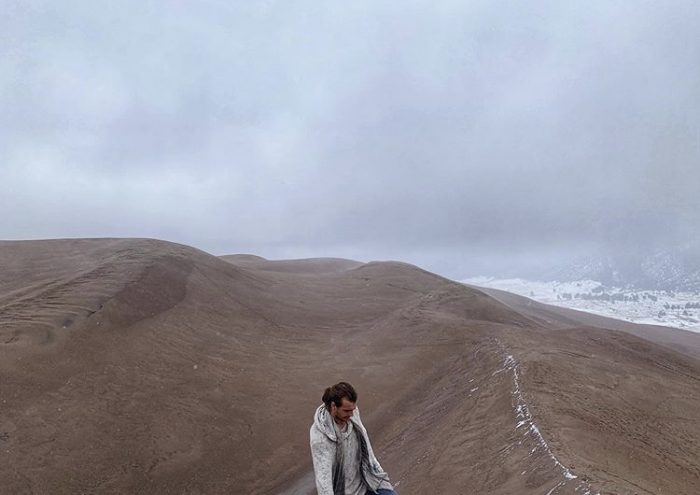People are usually afraid of something they cannot understand, and because of this, they judge or label it for being something it is not.
Poetry is no exception to this.
If you don’t understand the art of poetry, it is tempting to think of it as a joke. After all, what are a few words on a page about beauty, love, and death going to do for the world, you might think?
It is unfortunate that this mentality pervades the minds of many people, for poetry is so much more than mere words. And being a poet is much more wonderful and nuanced than you might think.
Yes, there is actual evidence out there showing that self-expression through writing is incredibly healthy for you, but that’s not what this article about. This article is written to honor the experiential aspect of being a poet, of living life in a stylish and celebratory way for the Divine, of testing reality to its limits, and of using the power of imagination to depict the essence – or “isness” – of reality.
There are multiple ways to define a poet. For this reason, I am not going to argue with someone about what it could or couldn’t be. Poets are evasive characters, anyways. Attempting to pin them down is like trying to catch a fly with one’s hands. There is no possible way a Shakespeare or Hafiz can be defined. They are not straight lines. That’s why they are geniuses and why they are severely misunderstood.
So, in order to escape the criticism of others (hopefully), I am simply going to share with you my own experience of what this journey means to me and why I love it so much.
To be a poet means to live life in a way that excludes boredom, linearity, cynicism, and mechanistic behavior. It is to live a life of the soul, to wear your heart on your sleeve, and to express yourself with style, grace, passion, and originality.
The writing comes second. It is not as important because it is the reflection of the essence—not the essence itself. People are often surprised when I tell them this, but it rings true for me every time I say it: the best poets are not writers of poems; they are masters at the art of living intimately with existence. Because of this, they are able to bleed timeless truths onto the page in front of them.
When I think of people who embodied the archetype of the poet I am trying to get at, two or three come to mind. But Rumi seems to be that one star in the sky that my eyes are completely fixated on. Rumi did not utter the truths he did because he was devoted to the life of being a writer, or even a poet. He was devoted to the highest truth–what Alan Watts called, “That in which there is no whicher”–and used poetry as a means to celebrate it, just as someone uses dance to celebrate the music they are hearing.
True poets understand themselves so well that they are drastically misunderstood by others. Some will see only the surface—or outer form—of the poet; his depth will remain hidden, and they will hear his words from a shallow place. They will appear to be only symbols: impractical, shoddy things. Others will tremble, and see the face of themselves in a poet’s expression. For those in the shallow end, Rumi said, “Do not look at my outward form, but take what is in my hand.”
When Rumi was a child, he would jump from roof to roof with some of his friends. And once, in a great act of magical spontaneity, he ended up on the roof of a building before his friends could figure out the way in which he did it. Without them knowing, he would slip behind and surprise them on the other side with a gorgeous grin. I imagine Rumi with his hands out as well, bowing, waiting for an applause of some sort.
Here is another story of Rumi that I absolutely adore and which gets at the nature of the poet I am trying to depict:
One day, Rumi’s teacher, Ibn Arabi, was giving a theological lecture in a temple to nearby locals on the nature of reality. After hours and hours of discussion, they approached the topic of God’s true nature. The discussion got quite heated, and each individual belabored their arguments. One philosopher said that God was, in essence, no different to nature. Another said that God was transcendent to nature. And Ibn Arabi, who was respected in the region for his philosophical brilliance, said that God was both immanent and transcendent. Just when things got a little out of hand, Rumi spun into the doors of the temple, unannounced and drunk in love, chanting the name of God with tears in his eyes. After dancing joyously for a considerable amount of time, he caught his breath, peered into the shocked faces of the theologians, and said,
“My dear friends, I am afraid you have missed the point entirely.”
That is how a poet sends a message. Instead of stating something or providing any argument, he embodies the mystery of existence, and from there, expresses himself—which throws others for a dazzling whirl. In many ways, he is like a Zen master, for in Zen what’s important is acting from a place that is before the conceptual mind. That is where true spontaneity lies and where the transmission of truth is strongest.
Stating a fact from the mind is nowhere near as powerful as acting—or writing— from the reality that lies before it.
So when a poet finally does decide to write, what appears to be words on a page are actually dance moves, or a style of Zen acrobatics, if you prefer. Sometimes they are subtle. Sometimes they are loud and passionate. But whatever style it may appear to be, it is certainly not boring. And thank goodness for that – because we are inundated with predictable and boring writers, spiritual and unspiritual, everywhere we look.
With a tidbit of hesitancy, however, I must say that a poet’s words are usually reserved for those who are close to the nature of reality, or those who have come to full realization already. That doesn’t mean they are not written for everyone; it just means they are infused with a meaning not everyone will grasp.
If nothing else, a poet should be respected for that reason, for it is a difficult and beautiful thing to leave secret treasuries beneath a universally shared throne.
You can only do that if you live life intentionally, passionately, and beautifully; if you are refined and full of wonder.
Rumi is not quoted by everyone and their grandma because he lived a life of quiet desperation. His desire for truth took him to the edge, and he jumped off that edge in order to understand the sacred wonders of the world. When he wrote down the results, his words had style and came incredibly close to saying what cant be said—something all poets aspire to do. That is why his words live on and why people remember them.
Poets, Remember this: you have to be “effing” close to the ineffable in order “eff” it.









Read 0 comments and reply